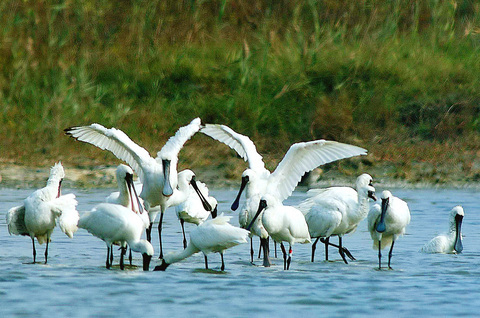At 757, Taiwan has seen a record high number of endangered black-faced spoonbills wintering in the southern part of the country, the Wild Bird Federation Taiwan said yesterday. The group made public their most up-to-date information on the species.
According to the federation, the record-high figure suggests an obvious improvement to the habitats where the birds spend the winter. At the same time last year, the number reported was only 628.

PHOTO: LIBERTY TIMES
On Sunday, a one-day global synchronic census on the endangered bird was carried out by conservationists associated with the federation. Yesterday, Fang Woei-horng (方偉宏), vice president of the federation, released a report on the census which shows that wetlands in Chiku, Tainan County, near Tsengwen Esturay is the most ideal site for the bird. Some 407 black-faced spoonbills were observed there. At wetlands in nearby Sitsao Township, 277 spoonbills were observed. Another 57 spoonbills were seen in the estuary of Bachang Creek, which straddles Tainan and Chiayi counties, four were seen in the Choshui estuary of Yunlin County, one at Chihpen wetland in eastern Taitung County and 11 at Wengdi wetland in northeastern Ilan County.
Federation secretary-general Chiang Kuen-dar (江昆達) told the Taipei Times yesterday that the result shows that conservation efforts made in the last decade have borne fruit.
"More wintering sites for the rare bird are now available. The number of spoonbills observed on wetlands in Sitsao, where is now an ecological reserve, has almost doubled since last year," Chiang said.
Since early September, the black-faced spoonbills returned to southern Taiwan earlier than they did in previous years, and in greater numbers. The peak number was measured in last month at 842.
Chiang said that some estuaries could be made into wintering sites for the bird if efforts were made to ensure proper habitat management.
Citing Aogu wetland near the estuary of Peikang River in Chiayi County as an example, Chiang said that bird watchers he talked to on Sunday said no spoonbills were spotted there. This is unusual, as the wetland is regarded by conservationists as one of the most important habitats for the wild bird, Chang said.
Conservationists soon figured out why the spoonbills were absent. Local authorities in the area destroyed 183kg of gunpowder at the ecologically sensitive site on Saturday, apparently driving the birds away.
Chiang said that a global census was conducted on the same day by conservationists in different countries, and a final report on the bird's global population would be released next month.
Black-faced spoonbills leave North Korea in winter for wetlands near river estuaries in the southern regions of Asia. They have been sighted along the southeast coast of China, Hong Kong, Macau, Taiwan, Japan, Vietnam and the Philippines. A global study conducted in January 1995 revealed that there were only 430 black-faced spoonbills in the world. However, the population has been growing, with a minimum of 1,069 counted in 2003 census and 1,206 last year.

A preclearance service to facilitate entry for people traveling to select airports in Japan would be available from Thursday next week to Feb. 25 at Taiwan Taoyuan International Airport, Taoyuan International Airport Corp (TIAC) said on Tuesday. The service was first made available to Taiwanese travelers throughout the winter vacation of 2024 and during the Lunar New Year holiday. In addition to flights to the Japanese cities of Hakodate, Asahikawa, Akita, Sendai, Niigata, Okayama, Takamatsu, Kumamoto and Kagoshima, the service would be available to travelers to Kobe and Oita. The service can be accessed by passengers of 15 flight routes operated by

GIVE AND TAKE: Blood demand continues to rise each year, while fewer young donors are available due to the nation’s falling birthrate, a doctor said Blood donors can redeem points earned from donations to obtain limited edition Formosan black bear travel mugs, the Kaohsiung Blood Center said yesterday, as it announced a goal of stocking 20,000 units of blood prior to the Lunar New Year. The last month of the lunar year is National Blood Donation Month, when local centers seek to stockpile blood for use during the Lunar New Year holiday. The blood demand in southern Taiwan — including Tainan and Kaohsiung, as well as Chiayi, Pingtung, Penghu and Taitung counties — is about 2,000 units per day, the center said. The donation campaign aims to boost

ENHANCING EFFICIENCY: The apron can accommodate 16 airplanes overnight at Taoyuan airport while work on the third runway continues, the transport minister said A new temporary overnight parking apron at Taiwan Taoyuan International Airport is to start operating on Friday next week to boost operational efficiency while the third runway is being constructed, the Ministry of Transportation and Communications said yesterday. The apron — one of the crucial projects in the construction of the third runway — can accommodate 16 aircraft overnight at the nation’s largest international airport, Minister of Transportation and Communications Chen Shih-kai (陳世凱) told reporters while inspecting the new facility yesterday morning. Aside from providing the airport operator with greater flexibility in aircraft parking during the third runway construction,

American climber Alex Honnold is to attempt a free climb of Taipei 101 today at 9am, with traffic closures around the skyscraper. To accommodate the climb attempt and filming, the Taipei Department of Transportation said traffic controls would be enforced around the Taipei 101 area. If weather conditions delay the climb, the restrictions would be pushed back to tomorrow. Traffic controls would be in place today from 7am to 11am around the Taipei 101 area, the department said. Songzhi Road would be fully closed in both directions between Songlian Road and Xinyi Road Sec 5, it said, adding that bidirectional traffic controls would